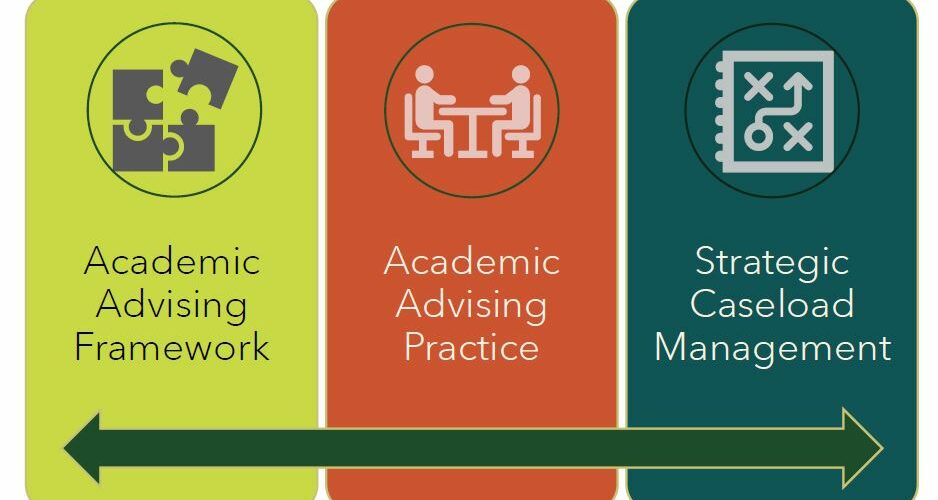Advising Competencies
Rationale
In establishing our professional advancement model, our goals are to:
- Recognize and promote academic guidance practices that improve the quality of undergraduate educational experiences and enhance student learning and success at CSU
- Acknowledge ASC/Advisors that have experience and are providing high quality academic guidance practices
- Implement this initiative within a framework of both merit and equity
Advising Framework
The Academic Advising Framework Competencies outline an advisor’s understanding of CSU culture and the context of academic advising within an asset and equity framework, student identities and development, and knowledge of curriculum and student support services. This framework promotes student learning, success, and graduation.
Students
- Characteristics, needs, and experiences of student populations, especially those that are first-generation, low-income, and racially minoritized.
- Student development, and identity/ intersectionality theories
- Importance of creating and maintaining equitable and inclusive environments
CSU and Advising Context
- CSU’s Principles of Community, land grant mission based on access and equity, and Student Success Initiatives
- CSU Advising Mission and Vision, University Academic Advising Strategic Plan, NACADA’s Core Values, and a culturally engaged advising asset and equity framework promoting student success
- Advising strategies, approaches, and best practices
- Outcomes of academic advising
Academic and Student Service Information
- Designated program and course requirements and field/industry/discipline related to degree programs
- Campus and community resources that support student success and wellbeing
- CSU policies and procedures implicating student success, persistence, and completion
- Legal considerations of advising including privacy and confidentiality such as FERPA
Academic Advising Practice
The Academic Advising Practice Competencies outline the advising approach based on the CSU’s Academic Advising vision, the depth and content of student advising sessions, and advisor’s skills and fluency in demonstrating impactful work in academic guidance and student success.
Advising Approach
- Center a humanized approach with care and commitment to each student’s success in cultivating meaningful relationships
- Empower all students to navigate their unique academic and career paths and foster learning, development, and academic success
- Provide holistic support acknowledging the interconnectness of student lives, and understanding nonacademic pressures
- Facilitate student problem solving, decision-making, meaning-making, planning, and goal setting skills and practices
- Incorporate multi-cultural awareness and inclusion into advising interactions honoring student’s intersecting identities and experiences at CSU
- Focus on a collectivist cultural orientation with teamwork and mutual success
- Utilize the integrated community of advisors including faculty and staff to enhance advising
Associated Training
-
- Asset Based Approaches in Advising Interactions
- Designing your Advising PhilosophyApplying the Student Ready Framework to your practice
- Efficiency, Sustainability, and Intentionality in Advising
- Advising Philosophies & Approaches: Flying by Navigation
- Round table discussion: Revisiting the Role of Academic Advising in Equitably Serving Diverse College Students
Advising Content
- Orientation and Transition-build rapport with students as they transition to CSU
- Sense of belonging- create safe, welcoming spaces to support their journey in creating purpose
- Academic and Career Planning- Provide objective support for students as they determine the major suited for them based on identities, interests, values and experiences.
- Academic Success- Explain various approaches to managing and enhancing the college experience, specific to students’ interests, identities, needs, long-term goals, and skills,
- Connection to support services and a support network- Make referrals, based on individual student situations, identities, and needs, being a conduit for students to connect to a larger support network .
- Course Selection focus on student centered advising and student driven conversation approaches, connecting course selection to academic and career goals.
- Student Engagement- Integrate career exploration, professional development, and high-impact practices in supporting a student’s holistic educational experience.
- Progression to Graduation- integrate career advising, communicate about the graduation contract degree check process, communicate about DARS early and often.
Advising Skills
- Provide clear, accurate, timely explanations of degree requirements, policies, procedures
- Manage time and calendar effectively to ensure accessibility to students
- Use effective teaching or group facilitation strategies
- Utilize campus-wide tools (e.g., advising notes to document outreach, Degree Progress Audit, Navigate)
Strategic
Caseload Management
Advisors providing the right support instead of the same support for all students. Academic advising practices for all students focusing on major exploration, transition support and connection to campus resources, academic and career planning, student engagement, and degree completion
Proactive Outreach
- For students with identified indicators at a certain point in time such as students with two or more of the following Early Performance Feedback indicators: not meeting expectations or not registered for the following semester.
- Reach out proactively to students, actively sharing information and opportunities and connecting students to resources.
- Implement institutional outreach efforts as well as tailored departmental outreach initiatives.
Tracking / Assessment
- Implement outreach and maintain accurate records through advising notes in Navigate
- Track students’ progress on standard measures such as persistence
- Interpret advising-related information, reports, and data provided by Institutional Research or Navigate
- Review student feedback about the advising experience to enhance advising
- Engage in on-going assessment and development of advising practices focusing on strategies to decrease the opportunity gap for first-generation, low-income, and racially minoritized students
Intentional Coordinated Support
- With ongoing support to smaller groups of students
- Coordinated care across the student success network.

